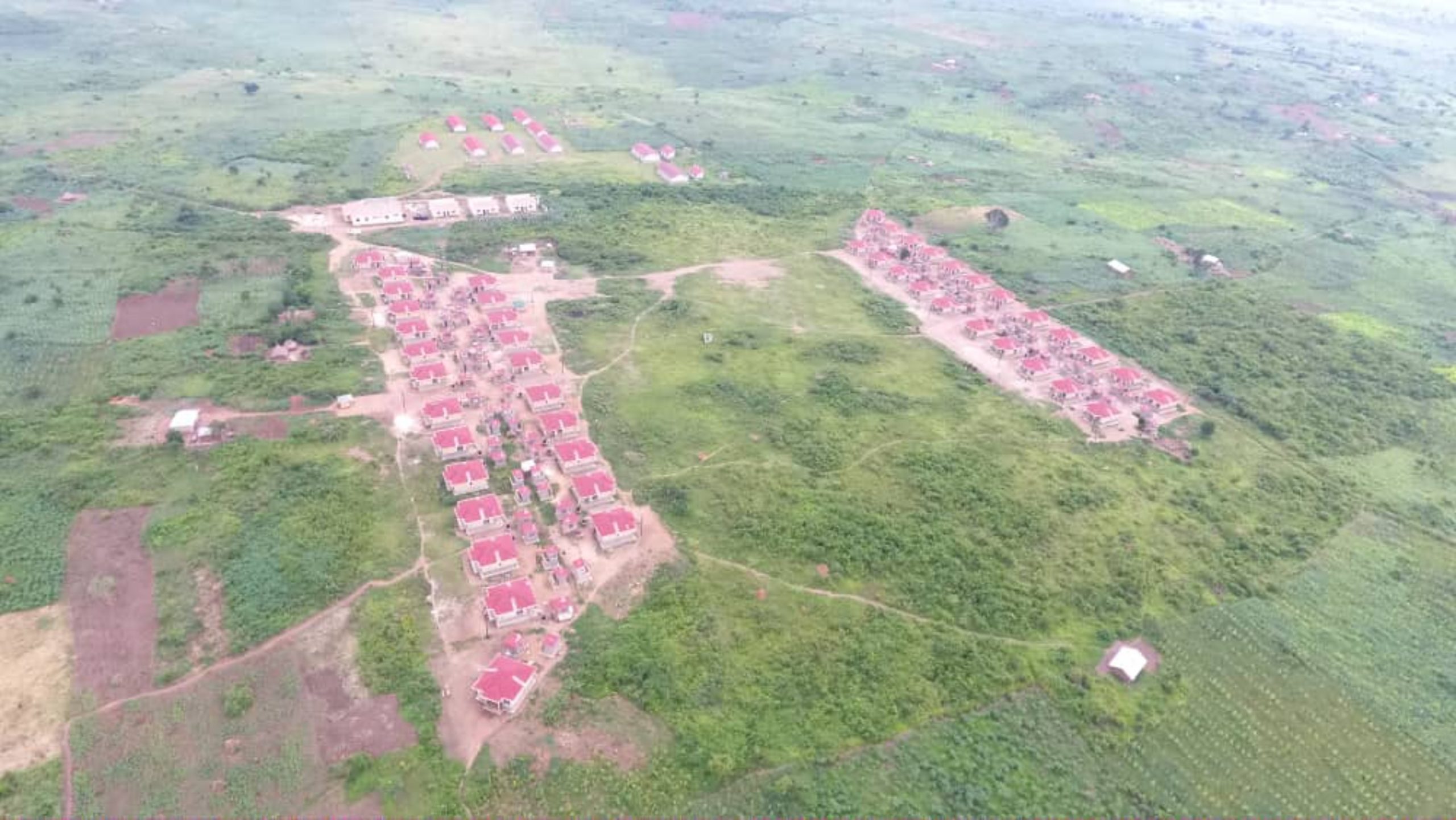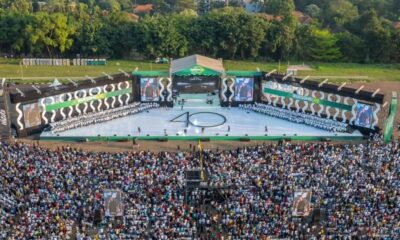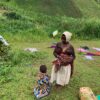Feature
The Economic and Social Outcomes of Kabaale Refinery PAPs years after resettlement
When Tumuhiirwe Fausta starts singing praises for Uganda’s oil, not even David and his Song of Songs in the Bible can compete. A single mother of four, Fausta is one of the 46 people that were relocated in 2017 to Kyakaboga resettlement village, Nyakabingo Parish, Buseruka Subcounty in Hoima district, from Kabaale to pave way for the construction of the Refinery.
Over 60kms away from Hoima City, she sits in her spacious three-bedroom house with a defined sitting room, store and bathroom. To her, this is a dream she never had before Oil was discovered in the Albertine graben. Fausta narrates describes her former home as a grass-thatched makeshift house which she shared with her four children.
She introduced me to at least 15 other PAPs who were attending a weekly meeting for their savings scheme (Tuyendembele Women’s Group Kyakaboga Resettlement) at her house since she is the chairperson. Off we dashed into her house where she indulged me in conversation and sang praises for the government.
“I have three bedrooms but I use one as a store for my maize and beans since three of my children are not home. The house is bigger than I ever expected to own,” says Fausta before calling her daughter to bring the phone so they could show me what is left of their makeshift house in Kabaale.
Despite the long distance from the rest of the villages and Hoima City, Fausta is excited about the access roads which she says never flood, the connection to the national grid and security.
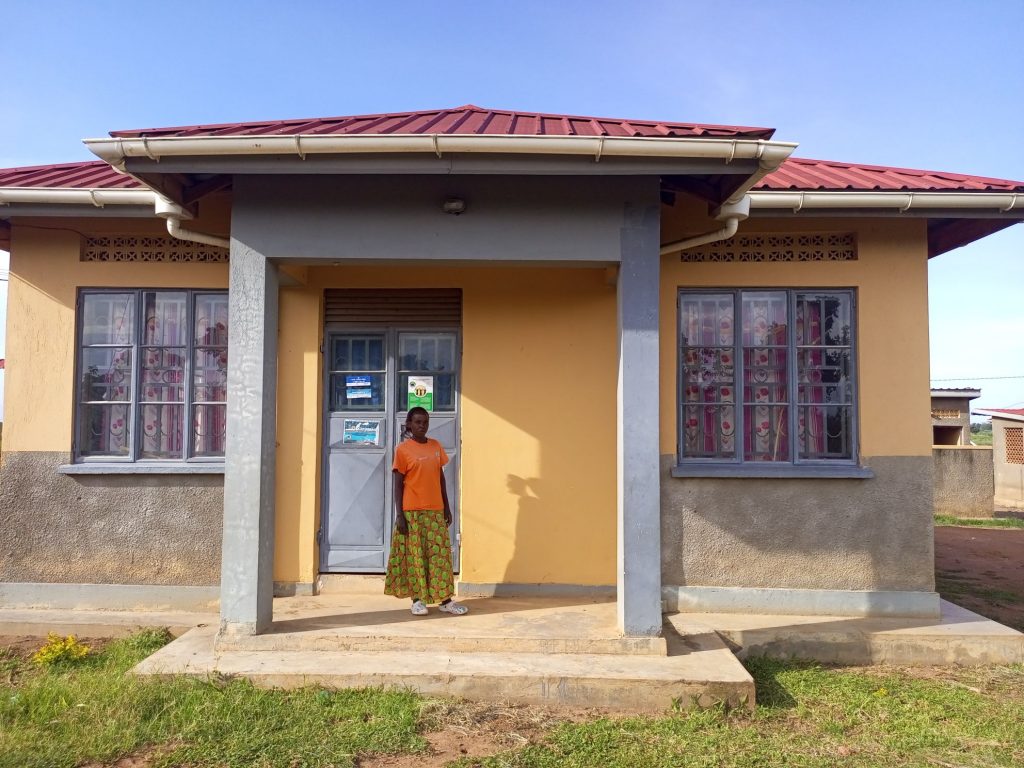
The Project
The Ministry of Energy and Mineral Development (MEMD) has been implementing Resettlement Action Plan (RAP) at Kabaale, Buseruka Sub-county in Hoima district for the acquisition of 29.57sqkm of land for Kabaale Industrial Park to host the Oil Refinery, the Hoima International Airport, as well as Petrochemical Industries.
The RAP was developed and implemented by a consultant, Strategic Friends International (SFI). The land acquisition affected 13 villages with a total population of 7,118 persons out of whom 2,753 were property owners. Whereas most of the PAPs opted for cash compensation and resettled themselves within Hoima and other neighbouring districts, 72 PAPs preferred in-kind compensation (46 Houses & 26 Land). The MEMD acquired 533 acres of land at Kyakaboga village in Buseruka Sub-County in Hoima district where for the physical resettlement of the PAPs. Working hand-in-hand with the Ministry of Lands, Housing, and Urban Development, MEMD registered the hand to the beneficiaries, complete with land titles.
Fausta is one of the 46 PAPs that received houses and land at Kyakaboga. She and her husband formerly lived in Kikuube district where they had four children. However, after over 15 years together, the man left her and the children in the house to marry another woman. He also sold the land they had bought as a couple, leaving her stranded.
This prompted Fausta to go back to her parents’ home in Kikuube. However, she said it was difficult for her parents to take care of the family of five that she had moved with.
“I am a single mother. My husband and I separated and he stayed in Kikuube where we were living. I then went to stay with my parents, but as you know Bakiga, it is difficult for parents to house you and your children after a marriage has ended. So, I had to look for some work and toil for my children” says Fausta.
After four years, she left her parents’ house which is also in Kikuube and bought some small land in Kyapuloni village, Kabaale, Buseruka Sub-county in Hoima district. On her land, Fausta had put up a makeshift grass-thatched house and had some other small land for farming. Unfortunately, two of her children dropped out of school after senior four. The girl still lives with her, while the boy is in Kampala working. Of the other two, one is in nursing school while the youngest is in Primary 6.
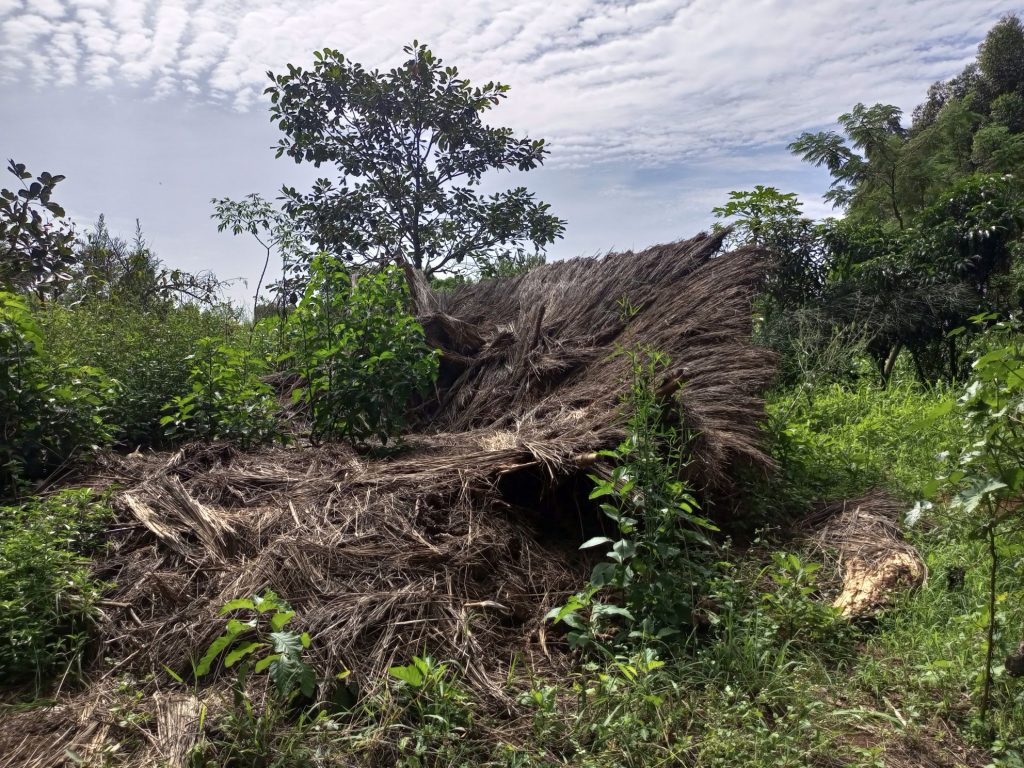
When the government came with an offer to build her a decent house and offer her 2 acres of land for farming at Kyakaboga resettlement area, she did not think twice. Despite most of her neighbours choosing to take cash, Fausta preferred the former option. She has since established a banana plantation and planted maize, beans and cassava all on her land.
The government set up several social infrastructures comprising a Primary School with seven classroom blocks, planned for about 900 pupils; a Police Post to ensure law and order in the Buseruka region; a Community Centre for organized social gatherings, and Market Stalls for business developments.
A 19km link road was constructed to provide access and Vehicular access within this village and link it to the wider Hoima district roads. These social infrastructures were planned by the Physical Planning experts from the Ministry of Lands, Housing and Urban Development, in consultation with the relevant District Authorities, and the PAPs.
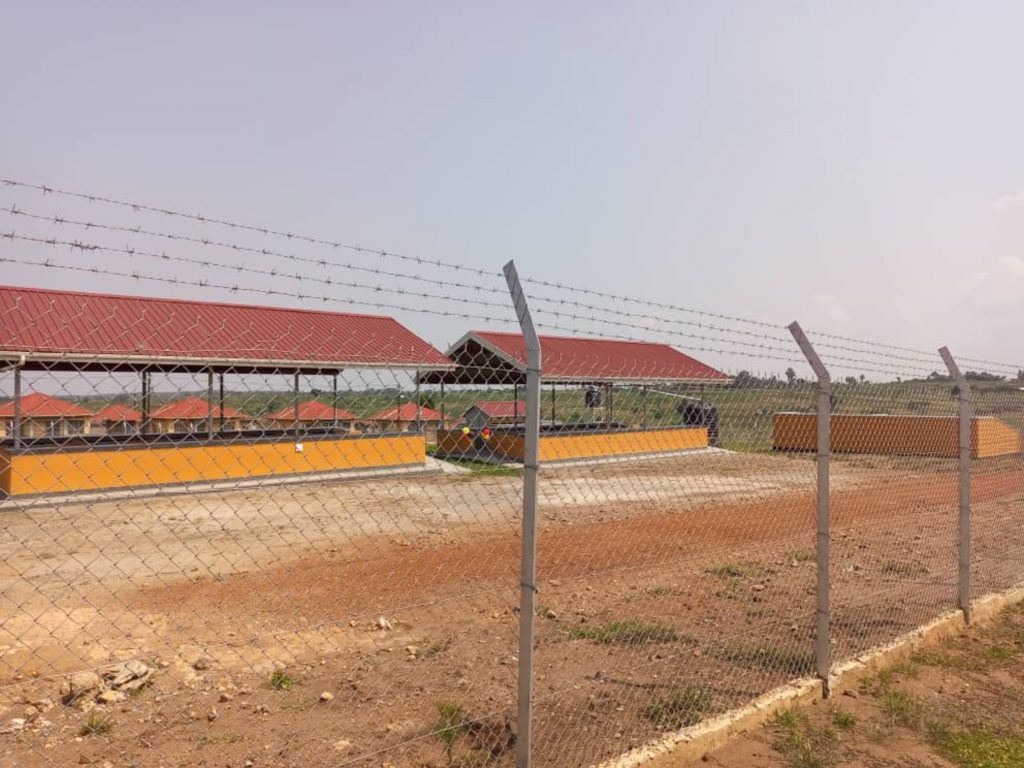
According to Eng Honey Malinga the Director Petroleum at MEMD, the PAPs formerly had a school with only one block, but now their new school in the settlement village has 8 blocks.
The beneficiaries received their land titles for their properties (land and house) in May 2022 at an event presided over by the Minister of State for Mineral Development, Peter Lokeris. An estimated 2,600 PAPs received cash compensation.
When Fausta and her neighbours first heard about the houses, they thought it was all a hoax. Even after completion, it took them a while to visit their new home and receive their houses.
“The shifting process was gradual. Most people were not sure the houses existed. We all thought it was another government lie. So, one day, I came with my two neighbours to see if indeed there were houses. We were all handed our keys and the gentleman who was in charge showed each of us our houses. I was ecstatic to see such a beautiful house,” says Fausta.
“Finally I could leave my grass-thatched excuse of a house. We went back and assured our neighbours that the houses were real and that there was a bathroom, toilet, kitchen, a water tank but most importantly, electricity. That is when they all started coming in one at a time to get their houses and later moved. However, some of them have since rented out the houses, while others sold and left,” she adds.
According to Eng Malinga, PAPs that previously had structures qualified for a house and farmland equivalent to the one acquired by the Government. The PAPS that previously had no houses only qualified for a plot of land, plus farmland.
“The criteria used was land for land and house for house and if you had both then you would qualify for “land and house” as per the compensation principle,” says Eng Malinga.
He also explains that they chose Kyakaboga based on the geological location and basically, Kyakaboga had a good geological location that would perfectly support the economic activities of the PAPs, such as agriculture.
“It is a well-planned estate that has the following: 46 resettlement houses and farmland for use by the residents, two churches, two health centres, 4 boreholes, extended electricity supply, community centre and market, access roads 18 Km, piped water will soon be extended to the village and a Police station. With an airport and other infrastructure being built in the nearby Kabaale, one has to appreciate that the long-term plan for the PAPs has been considered,” he says.
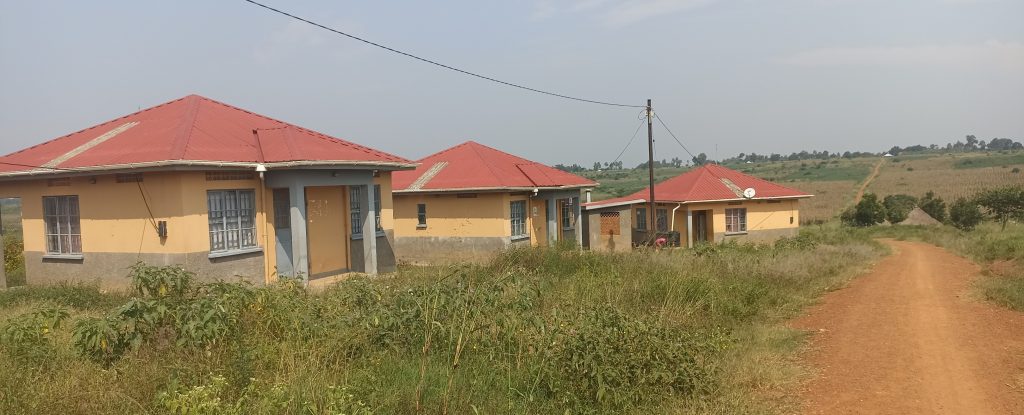
However, despite all these amenities, Fausta says they face challenges like long distances to social services, and they feel disconnected from the rest of the country. This has left them stranded with their agricultural products like maize, cassava and beans which do not have a market.
“My son is in p.6 and studies from Buseruka. Walking to and back from school each day is challenging but I do not have another option,” she says.
However, Eng Malinga says that the government put in place roads to ease access to different social services. They also upgraded the Health Centres in Kabale and Buseruka to serve the population fully.
“From the RAP study recommendation, other required social service infrastructures like access roads, police stations, and churches were provided alongside those directly affected infrastructures which were adequately replaced. Amongst the infrastructure not affected but provided/upgraded within proximity included the health centres (Kabaale Health centre and Buseruka health centre). The Ministry has no plans to build secondary school or health centre facilities within the resettlement village,” says Eng Malinga.
He adds that government has various interventions such as the Parish Development Model, Emyooga, and the Operation Wealth Creation initiatives which the PAPs have been encouraged to take advantage of. The PAPs are undertaking training in skills like catering, welding, etc. to empower their livelihood restoration amongst the youths.
But during my visit, Fausta and her peers who were in their savings group said they have never received such training about services like Emyooga and PDM since they are not recognized as an independent village.
“When the chairpersons of the other villages are invited for planning meetings, they only care about their people. They do not even think about us. That is why we want Kyakaboga to be declared an independent village so that we can elect our leaders to represent us in such meetings,” says Christine Nyangoma another PAP.
Nyangoma who is also a single mother of four was relocated from Kabaale to Kyakaboga. Nyangoma’s husband received cash compensation for the family house and land from the government before disappearing with it all and abandoning her in a rented small house.
“When they made us an offer of cash or in-kind compensation, my husband insisted that we take cash. We were called in to sign for the money but after it got to the bank account, he picked up everything and left. Fortunately, I had my small plot of land which the government took and compensated me with lank here in Kyakaboga,” says Nyangoma.
She was offered at least two acres of land for farming and space to build a house. Unfortunately, she has only managed to put up a mud house. She now lives in a trading centre near the settlement area where she runs a sowing machine. She also uses her other land for farming.
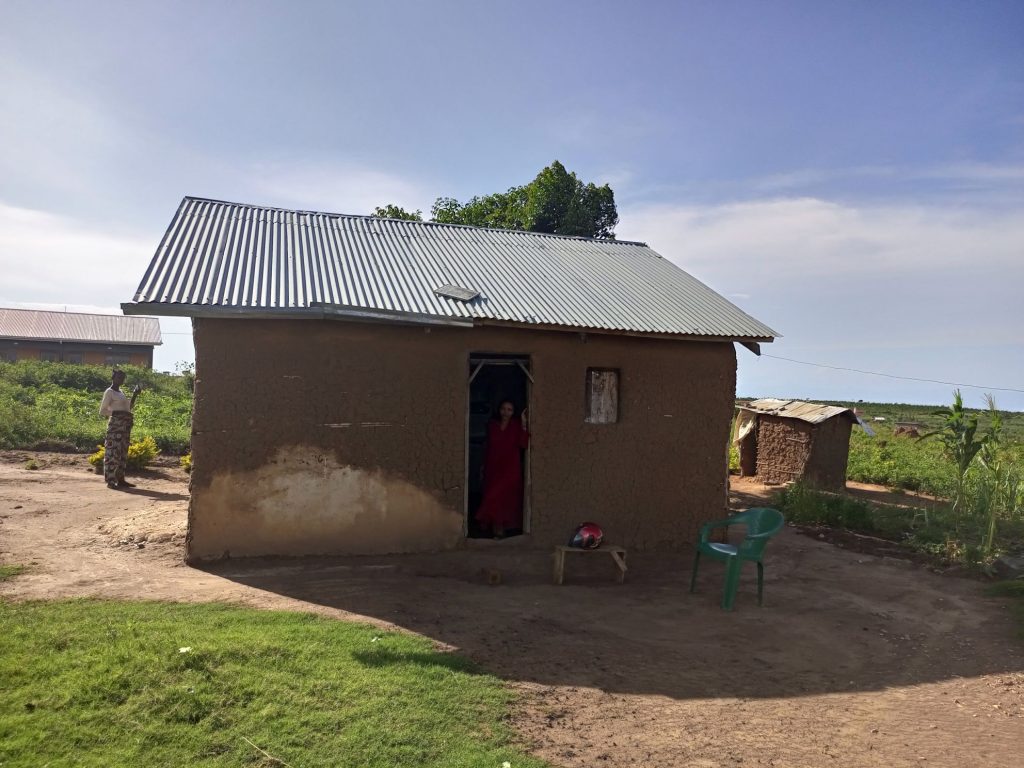
Nyangoma is thankful to the government for giving her such huge land. “I had a very small piece of land and when I attempted to sell it, I was offered only UGX270,000. However, the government gave me two acres here. My only disappointment is that they did not give me a house, and I am unable to build one myself as I still have to pay school fees,” she adds.
Her worry is the failure of the government to help develop their resettlement area. “There is only one shop serving the entire community. Even in the nearby trading centre where I work, it is hard to get customers because transportation is poor. Even when someone falls sick at night, we have to wait until morning to take them to the hospital. We have it all, but we are not empowered to use electricity and nice roads for development. These people forgot about us,” complains Nyangoma.
The community is also faced with tribal differences between the Alur and Bakiga who have failed to live together in harmony. “An Alur cannot buy from my shop. They think we will get money and develop our families while they lag behind. We are not living in harmony as a community and this is derailing the development of our area” adds Nyangoma.
She wants the government to help them find a market for their products, especially supplying Oil Company camps.
But, the Ministry of Energy says the local community has been empowered and capacity built on how they should prepare produce and products to meet the standards set by oil companies. Also, the government has ring-fenced certain services, goods and products to be provided by locals. The Local content laws are firmly in place to ensure that Ugandans benefit from the sector.
Kabaale, Buseruka was formerly a remote area. The area was famous in the 90s for harbouring the Allied Democratic Forces (ADF) rebels. ADF was formed from three groups-the Buseruka intake who were Tabliqs then called the Uganda Muslim Freedom Fighters, the National Army for the Liberation of Uganda (NALU) and the former Rwenzururu. The development of the area since the oil activities began is visible, from the roads, schools and health centres as well as activities like agriculture.
While the government was in charge of compensating the refinery PAPs, oil companies like Total Energies, CNOOC and EACOP have also compensated others in Tilenga, Kingfisher and Kikuube.


